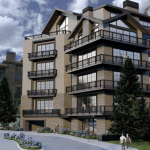The political orientation of a destination is shaping what visitors see and who might visit
Brought to you by the Vail Daily and the Insights Collective
Hiding in plain sight. While the world was dealing with the COVID-19 pandemic, and likely as one of its outcomes, the United States was further polarizing around nearly every cultural issue we faced. Red and blue became more vivid, as did black and white, male and female and young and old.
As our divisions become starker, it seems like everyday decisions would be influenced by which side of the dividing line a person stands. That is, how much are social issues and political perspectives responsible for product and brand choices, or to where people want to take a vacation?
Given this situation, we decided to research to understand better the extent that U.S. consumers’ positions on social/political issues and their perceptions of a destination’s socio-political orientation influenced decision-making to visit that destination.
Political variables factor into consumer choices
What we found first was surprising, but with deeper analysis, the findings began to make sense in today’s world. Political orientation, gender, race and the values within those categories are in play every day in the consumer marketplace.

Support Local Journalism
Vail offers a politically-neutral atmosphere for many
While much of the nation seems to be fracturing, those fault lines don’t see quite as apparent in the Vail Valley. Vail-based Realtor Mark Gordon said he thinks people in many disparate groups tend to buy in Vail because of a love of the place.
“There are other mountain towns that appeal to different (political) stereotypes,” Gordon said. “Vail appeals to people who love Vail,” something that can include people on both the left and right of the political divide.
Gordon added that Vail is “very much interesting politically — we pick and choose what works best for Vail.”
That includes people who simultaneously hold strong environmental beliefs as well as strong support for maintaining and building the strength of the local business community.
Environmental sustainability may also provide a draw
Kim Langmaid is a member of the Vail Town Council. She also founded the Walking Mountains Science Center. Langmaid said sustainability is becoming an increasingly important factor in travel decisions.
Langmaid noted there’s an increasing amount of data every year about the growing importance of destinations that have strong environmental credentials.
“If you look at the trends, travelers are choosing more sustainable options,” Langmaid said.
More travelers want to make sure they’re traveling to places where people take care of the local and global environments.
Langmaid noted that Vail has recently been recertified as a Sustainable Destination under the “Mountain IDEAL” standard. That standard is recognized by the Global Sustainable Tourism Council. The town was first recognized in 2017 as a Sustainable Destination.
Sustainability “is becoming a more prevalent conversation,” Langmaid said.
According to the 2020 Consumer Culture Report, “71% of consumers prefer buying from companies aligned with their values. Twenty-one percent of Baby Boomers surveyed say buying from brands that share their values and ideologies is essential; with Generation Xers, this number rises to 50%, and for Millennials, even more, 62% believe it is important.”
The research highlights the importance of aligning brand, company values and ethos with the customer’s, so that businesses seek to attract or retain to remain competitive and relevant.
Consumers not only purchase from companies and products aligned with their social or political beliefs, but two in three have boycotted a company they previously purchased from because of its stance on an issue.
Political orientation also influences where we live. A recent study by Jacob Brown and Ryan Enos suggests people live near others from the same political party. Using spatial data computation, the authors present evidence of extensive partisan segregation throughout the country. (ryandenos.com)
Personal politics also impact where we go on vacation
If political alignment influences the products we buy and where we live, why wouldn’t political orientation, gender, age, race, personal values and purchase behavior also influence tourism destination selection?
Our findings show that as many as 39% of those politically oriented to the right indicate a destination’s political orientation influences the types of places they visit. Thirty-five percent of those surveyed on the left indicate the same. Those that identified themselves in the center politically were the least influenced by the political orientation of a destination they would consider visiting.
Political Orientation Influences Types of Places Would Visit and Practices

And real-world politics influence visitor perceptions
These findings suggest significant implications for tourism destinations. Perhaps one of the biggest challenges for destination marketing organizations is that they cannot control how that message is being shaped to visitors and potential visitors.
A destination’s political perception is shaped internally by residents and politicians and externally by others outside of tourism, such as traditional media and social media influencers. Examples of this can be seen at every level.
At the state level, consumers have seen the impact of political orientation in Georgia and the impact of its legislature’s changes in voting regulations. These resulted in Major League Baseball relocating the All-Star game to Colorado, as well as critical responses from Delta Airlines and Coca-Cola, two of Georgia’s most venerable, locally-headquartered corporations. They are now joined by a host of other companies based in and outside of Georgia.
How much impact do ongoing protests in Portland, Oregon, influence consumer decisions not to travel there? In Southern California’s trendy Huntington Beach, one of the coast’s most desirable areas, this politically conservative city was recently the site of a controversial “White Lives Matter” rally. How many consumers will subsequently decide that this is not a resort town they want to visit?
The political orientation issue can also be regionalized as DMOs in the South have had to juggle issues related to Confederate monuments being publicly fought over by those for and against their removal.
Insights Collective; a Tourism Economy Think Tank and Resource Center – is a collaboration of destination travel industry experts who are collaborating and working, together with mountain resort communities and their stakeholders, to understand, plan, and navigate through the emerging tourism marketplace. TheInsightsCollective.com / info@theinsightscollective.com
So how do you still promote tourism in this climate?
Amid this polarization and politicization, DMOs are still tasked with destination promotion and messaging. While they are crafting inviting messages to visit, some are being undermined by political events they can’t control. And in other cases, they may be turning off a part of the traveling public.
More recently, some DMOs indicated they want to attract the “right kind of visitors,” those that match their destination’s values. Which side of the divide will consumers perceive they are on in taking this positioning? Is it the logical extension of a divided country?
Historically, the tourism industry has been about communicating destination attributes and largely avoiding political issues. This situation is changing. Perhaps it was inevitable that polarization would reach the tourism industry. It is new territory and destinations are going to have to be very nuanced moving forward.
But be careful; taking a position can either repulse some of the more significant generic visitor segments or align with others. It could attract entirely new visitor segments looking for a place where they feel comfortable, or completely turn off others.










